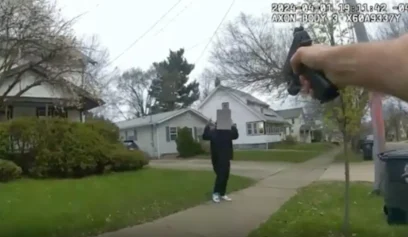A North Carolina task force on Monday unveiled a slate of reforms aimed at eliminating racial disparities in the state’s criminal justice system.
The policy and legislative proposals are recommendations designed to decrease systemic practices in law enforcement and the courts that harm Black people at higher rates.
The recommendations were released in a 166-page report that was delivered to North Carolina Gov. Roy Cooper on Monday.
Among the proposed measures included in the report are a statewide ban on neck holds, policies requiring police to intervene and report when they witness other officers using excessive force, raising from 6 to 12 the age when students can be thrown into the juvenile justice system to “reduce school to prison pipeline,” and creating a statewide database to track complaints and avoid a “wandering officer” with a history of problematic behavior.
“The inequities that African Americans experience — whether it’s in the economy, healthcare, our schools, or the criminal justice system — are pervasive. They’re damaging and they are wrong,” North Carolina Attorney General Josh Stein said during a virtual press conference Monday. “Any senseless act of violence is tragic. But especially so when perpetrated by those sworn to protect and defend us. It represents such a fundamental violation of the authority we grant law enforcement and the trust we place in them. It also undermines the important and hard work of the many, many police officers who serve our communities with dedication and compassion.”
Cooper, a Democratic governor, convened the Task Force for Racial Equity in Criminal Justice in June amid the outcry from George Floyd, Breonna Taylor and other police killings. The 24-member task force included input from police chiefs, sheriffs, judges, district attorneys, public defenders, victims rights advocates, community-based activists and citizens across the state.
Stein co-chaired the task force with North Carolina Supreme Court Associate Justice Anita S. Earls, a Black former civil rights attorney. Earls said task force members began meeting July 10 and continued to brainstorm the proposals for the sweeping changes until Dec. 8. They spent five months “looking at the system holistically,” staging 61 livestreamed meetings with two work groups focused on the courts system and two focused on law enforcement, she indicated.
Now the focus shifts to getting the recommendations implemented. The Task Force will work with policymakers and agencies across the state over the next two years to get the solutions incorporated into actual use.
“We will do our best over the next two years,” Earls said, “but the system was created in more than two years, and we think that continued monitoring of the recommendations that are adopted and continued examination of these issues should be something that we do on a permanent basis.”
Black adults are nearly six times more likely to be incarcerated, twice as likely to be pulled over for a traffic stop and more likely to be jailed before trial than their white counterparts nationwide, U.S. Bureau of Justice statistics show.
The task force aimed to “reimagine public safety” to stem many of those inequities. Stakeholders recommended beefing up how North Carolina law enforcement officers are trained to include tutelage in ethics, race equity, implicit bias, emotional intelligence, mental health, conflict de-escalation, crisis intervention, proper use of force, and duty to intervene.
In the courtrooms, the panel sought alternative models and increased funding to pay for community-based restorative justice programs. One of the policy changes the task force recommended to state lawmakers is to decriminalize possession of up to 1.5 ounces of marijuana.
Earls said 61 percent of the people convicted of small pot possession in 2019 were non-white even though research shows whites and non-whites use the drug at the same rates.
The task force also proposed reclassifying class III misdemeanors that don’t impact public safety, such as sleeping in a public place, begging, driving while license revoked — as long as the revocation doesn’t stem from impaired driving. Those criminal acts would become non-criminal civil infractions if the plan is implemented.
In other areas, the task force suggested civilian oversight committees, eliminating cash bail for class I, II and II misdemeanors that don’t threaten public safety, reforming how jury pools are selected and creating a state commission for the jury system.
The implementation phase continues through 2022, and will hone in on legislative, administrative and budget requests to foster the reforms in law enforcement and the courts system.
One of the proposed legislative changes is the establishment of “truth and reconciliation commission” that will study the state’s racial and criminal justice history.
Henderson Hill, a senior attorney for the American Civil Liberties Union and director of the North Carolina Death Penalty Resource Center, was part of the task force. He called the 125 recommendations a starting point that could serve as a long-term commitment toward paving a pathway to racial equality in the Tar Heel State.
“It took us 400 years to get to a legal system that is grounded on racism and white supremacy,” Hill said when asked about the truth and reconciliation commission during Monday’s press conference. “You’re not going to undo that in five months, five years or a generation. It’s a process. And I think what the truth and reconciliation process is it says before you can fix or correct, you’ve got to speak truth. And I think many of the problems we face … they grow out of a legacy. Out of the Black codes, of the period of enslavement, Jim Crow. So undoing that legacy takes public education, takes a process. And I think what was good about the taskforce, it began that important discussion.”
Republican lawmakers hold a majority in the North Carolina Senate and State House. During the presentation, a looming question was how the task force could push the policy proposals through the two chambers of the GOP-run General Assembly.
Democratic State Rep. Marcia Morey pointed to the Second Chance Act, a bipartisan criminal reform bill that passed into law in December 2019 as proof that the political parties could work together. The law expanded how people could get their criminal records cleared of low-level convictions, not guilty verdicts and charges that have been dismissed.
“We see these recommendations not as political recommendations at all,” Morey said. “They are backed by data, and it’s to achieve equity. It is to achieve equality in our criminal justice system.”
Raleigh, North Carolina, police Sgt. Billy Gartin said he thinks the reforms will ultimately be accepted by a vast majority of LEO agencies. Although they will likely take time to implement, he did not anticipate much rejection from the blue line.
“Change is sometimes difficult for any organization to take full heartedly,” Gartin said. “And to say that there are probably going to be some minor grumbles about some of the recommendations that we made, it goes with the territory of trying to implement wide-reaching organizational change throughout any organization, let alone all the law enforcement agencies throughout North Carolina. However, I think once the agencies started to really get the nuts and bolts of what we have all kind of worked together to suggest, I think they’ll find out that the change is not as daunting of a task as it may seem.”


